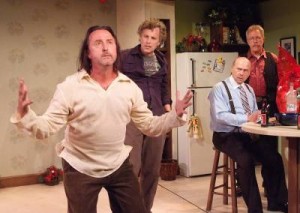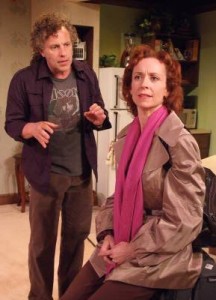
It was 1969, aka the Summer Of Love, and an aspiring San Fernando Valley rock band was about to get its first big break as opening act for The Buckinghams, whose “Kind Of A Drag” had hit #1 two years before. Ultimately, however, fame escaped The Weeds, and even now, twenty-five years later, that one summer remains the high point in the lives of its four members. True, all four 50something friends have gone on to varying degrees of career success, but as the years have passed, that summer a quarter century ago has acquired a golden glow for “the greatest rock band that nobody’s ever heard of.” It was a summer filled with “cheap dope and easy women,” a time when the four friends gave themselves “permission to dream.” If only they could go back in time, or somehow bring back that perfect moment in each of their lives.
This is the premise of Charles Bartlett and Jack Cooper’s That Perfect Moment, one of the best new plays I’ve seen in quite a while, and one which I’m indeed fortunate not to have missed. Rave reviews prompted producer Racquel Lehrman to bring back That Perfect Moment following its October-November run at the NoHo Arts Center. The return engagement (at Burbank’s Little Victory Theatre) is welcome news for L.A. theatergoers in search of laughter, nostalgia, and even a tear or two. Directed to perfection by Rick Sparks and featuring all-around terrific performances from its cast of five, That Perfect Moment makes for a nigh-on perfect evening of theater.
Pony-tailed university professor Mark (Tait Ruppert) has recently been offered the chance for a Weeds reunion as part of a “Voices From The Past” oldies-but-goodies CD being put together by music agent Woodley (Kelly Lester). All Mark has to do is write a new song, which will be paired on the CD with the group’s one-and-only (almost) hit “Break Down The Walls,” and persuade his former bandmates to join him. Gabe (Guerin Barry) and Al (John Bigham) are fairly easy to convince. The sticking point will be Weeds drummer Skip (Bruce Katzman), who owns the rights to Mark’s songs and has threatened Mark with litigation if he so much as hums one of them in the shower.
Mark circa 2005 isn’t the most together of human beings, or at least that’s what his bandaged nose and black eye would appear to suggest. That, and the fact that wife Sarah (Lester again) has packed her bags and is moving out, last night’s fisticuffs at a university gathering having proven the final back-breaking straw. Sarah does give Mark one last chance to sit down and discuss their problems, but the boys in the band are set to arrive at any minute in anticipation of Woodley’s phone call, and having to choose between his marriage and a Weeds reunion—well, that’s like having to choose between The Beatles and The Stones, isn’t it? Needless to say, Mark’s decision to put The Weeds first sends Sarah out the door.
First among The Weeds to arrive at Mark’s is Gabe, a sophisticated, sarcastic silver fox of a gay lounge pianist, sequin-studded nutcracker gift in hand. (It’s the Christmas season, as the decorations in Mark and Sarah’s San Fernando Valley home attest to.) Then comes Al, a hippy-dippy chiropractor with an all-too-obvious “organic” dye job (“I did it myself. It’ll wash out.”) Last to show up is corporate big shot (and Weeds drummer-turned-Republican) Skip, still blissfully unaware of Gabe’s plan. It was Skip who footed the bills back in the 1960s before an acrimonious falling out with Mark prompted him to take legal control of their songs as payback.
On the surface, That Perfect Moment hinges on the question of whether Mark (with Gabe and Al’s support) can convince Skip to let bygones be bygones and agree to a Weeds’ reunion. Bartlett and Cooper’s script digs much deeper than that, however, creating four very real aging rockers made even more authentic by Ruppert, Barry, Bigham, and Katzman’s beautiful, multilayered performances.
There are laughs galore in the playwrights’ clever, witty script. Having lost his lease, Al now plies his trade in a public park, handing out flyers to passing joggers. He cheerily informs his friends that he adjusts Cher’s back. (No, not that Cher. His dog Cher. After all, “she’s a vertebrate, I’m a chiropractor.”) Skip has chosen to reveal his political party switch in a form letter slash wedding invitation, the truth being too hard to divulge face-to-face, even after repeated practice saying the word “Republican” in the mirror. Al makes a vain (but hilarious) effort to instruct Skip on the correct Japanese pronunciation of Skip’s latest wife Fumiko’s name. Gabe is always there with a sassy comeback on his lips.
But there are also truths to be told. Gabe worries about what kind of future is out there for an “aging queen.” Mark is told to “stop playing the victim and grow up.” Stan’s success as a businessman may have bought him an eight-bathroom home in Calabasas, but it hasn’t brought him happiness. Al can’t remain a scraggly-haired middle-aged hippy forever. As the evening progresses, old resentments resurface, secrets are revealed, and new bonds forged.
Acting students in search of a master class could do no better than to observe the work of these seasoned performers. (Both Ruppert and Katzman have major Broadway credits, and all four have résumés a mile long.) Even with Bartlett and Cooper’s literate script, Mark, Gabe, Al, and Skip could easily become stereotypes in the hands of lesser performers. Ruppert, Barry, Bigham, and Katzman make them real. Bigham particularly imbues Al with a heartfelt sweetness and genuineness which goes far beyond the clichéd stoner. A phone call between estranged father and son is a tour de force acting moment for Barry. Most revealing of all is simply to watch the four actors as they listen to whoever is speaking, each man’s subtle reactions absolutely right for his character and absolutely different from the others’. Lester has less to do once her character has departed, though we do glimpse her “escape” from time to time, yet she too does fine work as a wife frustrated to the breaking point by her slacker husband but still, despite herself, in love with him.
Set/projection designer Adam Flemming has created a nicely scaled-down San Fernando Valley living room/kitchenette, the set’s upstage wallpaper serving as a screen upon which are projected images of the band’s 1969 selves, embodied to a T by sexy up-and-coming L.A. musical theater performers Harley Jay, Tyler Milliron, Aldo Puccini, and Jesse James Rice. The wallpaper turns out to be a scrim which disappears when lit from behind by Jeremy Pivnick, allowing us to follow Sarah’s drive out of the Valley and Woodley’s phone call with “the boys.” (Pivnick’s lighting is, as always, top-notch.) Sky Keegan’s songs for The Weeds have a just-right late-’60s feel about them. Sharell Martin has created two sets of terrific costumes, the 1969 period garb worn by The original Weeds (on film and poster) and the 2005 outfits reflecting where each Weed is today. Joseph “Sloe” Slawinski’s detailed sound design includes Iron Butterfly’s “In-A-Gadda-Da-Vida” (on vinyl), performances by The Weeds, cell phone rings, speaker phone conversations, and more. Diane Martinous’s wig and hair design fits each character, past and present, though Mark’s ponytail could stand a better color match. There’s even a comic fight sequence nicely staged by fight director Mike Mahaffey.
That Perfect Moment is currently scheduled to close on January 17, and though an extension is to be hoped for, I wouldn’t take my chances if I were you. Whether you are of age to remember (as this reviewer does) the Summer of 1969 or not even born till the Summer of ’79 or ’89, That Perfect Moment is likely to get you cheering. It is the last best new play of 2009 or (for StageSceneLA) the first best new play of 2010. Either way, it is an all-out winner.
The Little Victory Theatre, 3324 W. Victory Blvd, Burbank.
www.plays411.com/perfect
–Steven Stanley
January 1, 2010
Photos: Ed Krieger




 Since 2007, Steven Stanley's StageSceneLA.com has spotlighted the best in Southern California theater via reviews, interviews, and its annual StageSceneLA Scenies.
Since 2007, Steven Stanley's StageSceneLA.com has spotlighted the best in Southern California theater via reviews, interviews, and its annual StageSceneLA Scenies.







 COPYRIGHT 2025 STEVEN STANLEY :: DESIGN BY
COPYRIGHT 2025 STEVEN STANLEY :: DESIGN BY